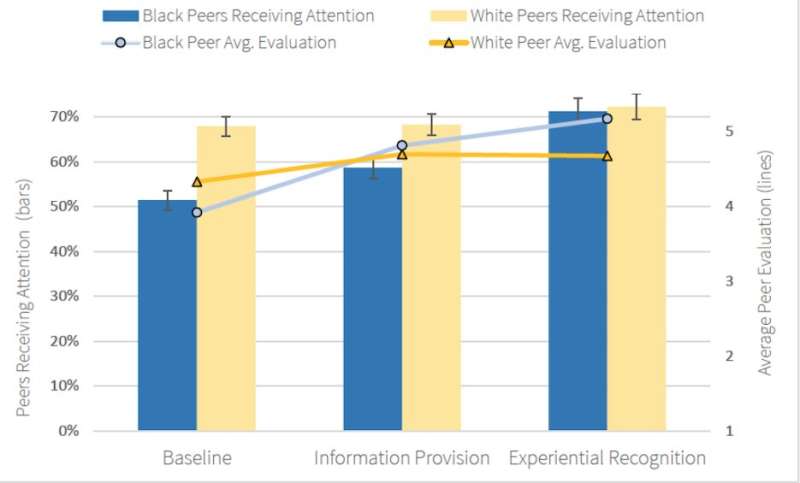White Americans pay less attention to Black peers, says a new study

In a study of more than 2,500 participants published today in Science Advances, Sheen S. Levine, adjunct research scholar in the sociology department at Columbia University and professor of management at University of Texas, Dallas; Charlotte Reypens, postdoctoral fellow at the University of Warwick; and David Stark, professor of sociology at Columbia University, show that white Americans pay less attention to Black peers.
In earlier research, Stark and Levine showed that an ethnically diverse group of traders was more likely to calculate accurate prices for stocks, making the case that a diverse workforce is a smarter workforce.
Years after this research was published, Levine observed that people in the business community "seemed earnestly interested in promoting diversity." However, in his conversations with Black people in the workforce, he learned that they "felt welcome at the door," but their ideas and accomplishments were often ignored. To test this lack of attention, Levine and Stark developed a model to measure people's willingness to learn from others.
In the current study, the researchers gave study participants, a group of gender-balanced white Americans, a puzzle with the offer of a bonus if they answered correctly. Each participant was able to see how their peers, either white or Black, solved the same puzzle, and could choose whether to learn from them. The only way to get the right answer was to use input from the peers, allowing the researchers to test whether participants were more likely to dismiss information from one racial group.
In fact, the researchers found that participants were 33 percent more likely to pay attention to and learn from white peers compared to Black ones; they also rated Black peers as less skilled than white peers.
"Leaders of organizations should pay attention to these findings in order to understand racial disparity in patterns of attention," Stark said. "It's in everyone's interest that we find ways to remedy this 'racial attention deficit'."
But the researchers also found that the bias could be reversed.
When they gave study participants details about their peers' achievements—things like past awards and degrees—participants rated the Black peers just as competent as the white ones, but were still reluctant to learn from them. What made the biggest difference in the puzzle task, though, was giving participants a chance to work side-by-side with peers. When participants saw how competent their Black peers were, they followed their lead in a second round of the game, the study found. The bias disappeared.
"Diversity promotes enhanced levels of performance," said theoretical physicist Sylvester James Gates, Jr., president of the American Physical Society, and a recipient of the National Medal of Science. "However, diversity only works if there is a vigorous exchange of ideas. In the paper, Racial Attention Deficit, Levine, Reypens, and Stark illustrate how this communication is not occurring between white and Black colleagues to the detriment of the workplace environment."
"The authors of this paper have made a significant contribution to the social sciences by demonstrating behaviorally how and how much white people ignore, overlook, and underestimate Black people," said Michèle Lamont, professor of sociology and African and African American Studies at Harvard University and former president of the American Sociological Association. "Their study of 'recognition gaps' explores new paths in our understanding of how inequality operates, which has everything to do with how everyday judgements of worth are omnipresent and make racism so hard to combat."
More information: Sheen S. Levine et al, Racial attention deficit, Science Advances (2021). DOI: 10.1126/sciadv.abg9508
Journal information: Science Advances
Provided by Columbia University




















